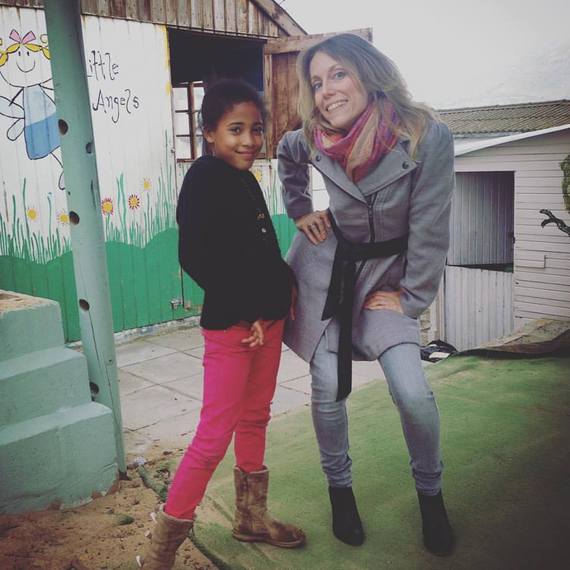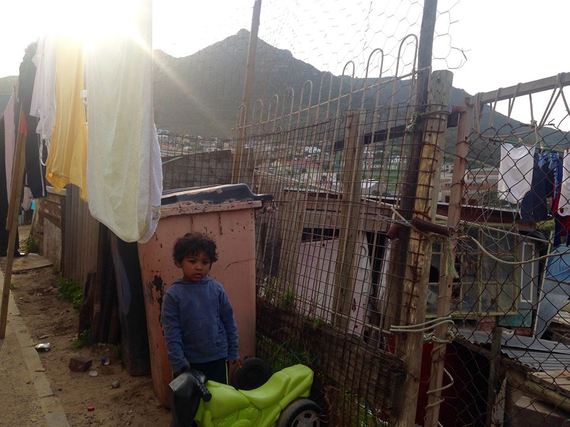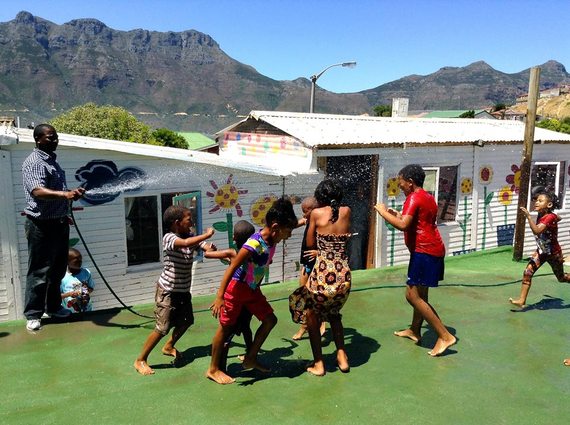Sometimes it seems like things conspire to come together. As if you are handed three pieces of the same puzzle simultaneously and hence, you see a bigger picture. Had you only been handed one piece, you might very well have missed the whole. (Or, erm, maybe there was no whole...)
A little while back I was devouring a catalogue by the interdisciplinary design firm Urban-Think Tank (U-TT), who we are now working with at Little Angels (a charity in the township of Hangberg, South Africa) to build a sustainable community center. Reading the catalogue I was impressed not only by their sustainable angle and how each building served a variety of different purposes (from gathering rainwater for the poor, to enabling roof gardens to be able to sell crops and helping the environment), but also by stats showing how different buildings lowered crime rates. Turns out people are less prone to crime if they have a gym to go to instead of loitering in the streets.
What also really stood out to me was that U-TT work with impoverished communities to create change. They don't say what to do, they invite the community, within architectural reason, to say what they want.

Me at Little Angels last winter -- wooden shacks coupled with no electricity made for a cold winter. Today we have a kitchen container and a bathroom container as well.
Our future plans of building then led to me having to arrange workshops in sustainability and design for our organization, as the owners needed to know their options when asking for what they wanted and there was a lot of fear around the concept of sustainability, thinking it was "white man's thing" and therefore couldn't serve a poor community, whereas in fact the opposite is true. This got me pondering how knowledge is the only way to provide option. And without option people are helpless -- they will take what they're given because they don't know they have any other choice. If there's choice and one option is more familiar, people may also opt for that as it feels more secure. Without education anything new seems scary. As the saying goes: "Better a known devil..."
In other words: to empower people you need to give them choice and education around that choice.
Fast forward a few weeks and I found a blog on Wordpress when looking around for new blogs to follow, that spoke about a woman, Prajna Desai, who wrote a cookbook in India by inviting women to do a workshop with her, sharing their recipes. She was empowering the women by letting them share their recipes, as opposed to only trying to teach them something. She let them see the value they were adding.
Prajna wasn't so much educating people about choice, but she was empowering people by having them add their skills to the final product.
I, on the other hand, was getting busy planning a documentary for Little Angels. A documentary that will capture life in Hangberg whilst showing what Little Angels can and will do to positively impact Hangberg if we have the right resources. I knew I needed stats to back up my theories and I started to realize I was really keen on doing workshops... but on what? Empowerment seemed obvious -- sharing problems and discussing solutions for Hangberg was on the cards. Tentatively I started asking the youth their opinions about problems and solutions.
The police is corrupt. There's drug sellers at school, if I tell the police I'll get busted. They'll find me. The solution for changing my life? Move away from Hangberg. -- Little Angels Youth Member
It was clear we needed educational workshops -- I couldn't just ask people about problems and solutions. If people had the solutions, Hangberg would already be different. In addition I wanted to empower people by having them provide their skills whilst also giving them choice; options for their future, which is essentially what Little Angels will help with through education and what the documentary needs to show.
Life in Hangberg.
Then I got talking to a client of mine, Jovani, about writing for them about the true meaning of beauty and how dresses can enhance this.
Today, dresses continue to play a major role in how women see themselves as individuals and their place in society. For example, if someone wears neutral shades and no accessories, they might be stuck not just in a style rut but also a psychological one. For others, fashion is about power, especially if they're known for wearing low-cut necklines or sexy form-fitting silhouettes. -- Saul Maslavi, CEO, Jovani
As it turned out it was a friend of mine's birthday as well, so I took her to the movies as a treat and we watched The Dressmaker. In the movie Kate Winslet's character literally transforms lives by doing make-overs.
Gertrude 'Trudy' Pratt: A dress can't change anything!
Myrtle 'Tilly' Dunnage: Watch and learn Gertrude, watch and learn!
I started relating this back to our building project -- can architecture and interior design change how we feel about ourselves? I always said that if my surroundings aren't a true representation of my heart, I don't feel happy. I decided to chat to my friends at the homeware company Izzz about this as I wanted to know their thoughts and see if, erm, companies would be willing to sponsor some make-overs...
Having a space that makes you feel both mentally and physically safe is vital, especially in the era of cyber bullying, in particular for young people. By having that "head space" that a safe and well thought out household or work space can give you, you can free up mental energy that you can spend on your passions. -- Israar Saeed, CEO, Izzz
Israar came at it from a space of privilege -- mental energy to spend on your passions, rather than energy not to succumb to criminality, abuse and drugs are two different things -- but by the end of the day they boil down to the same concept.
Then another friend of mine sent me a video about a photographer and designer, Jeremy Cowart, who started a not-for profit project, Help-Portrait, to take people's portraits to empower them. As I always loved taking people's portraits to really capture their beauty through photography, this hit home with me.
The idea of make-overs seemed to be hailing down from above.
Could I bring people together to change their perception of self and of Hangberg? Could we come up with how we want the future to look by design, as opposed to walking the paths paved by ours and Hangberg's past? Could I then, together with sponsors, get people involved in real-life make-overs of themselves, Hangberg and Little Angles?
We shape our buildings; thereafter they shape us. -- Winston Churchill
What do you think? Do you think positive surroundings would help you face your problems head on (instead of, say, hiding in drugs) and overcome them? Would you join me for a three month long personal and home makeover if you could? Would you enjoy a challenge like that if we created an online group as well and didn't just do it in Hangberg? Do you think it would change your sense of self? Please let me know if you would.
This post was first published on the Little Angels blog.

